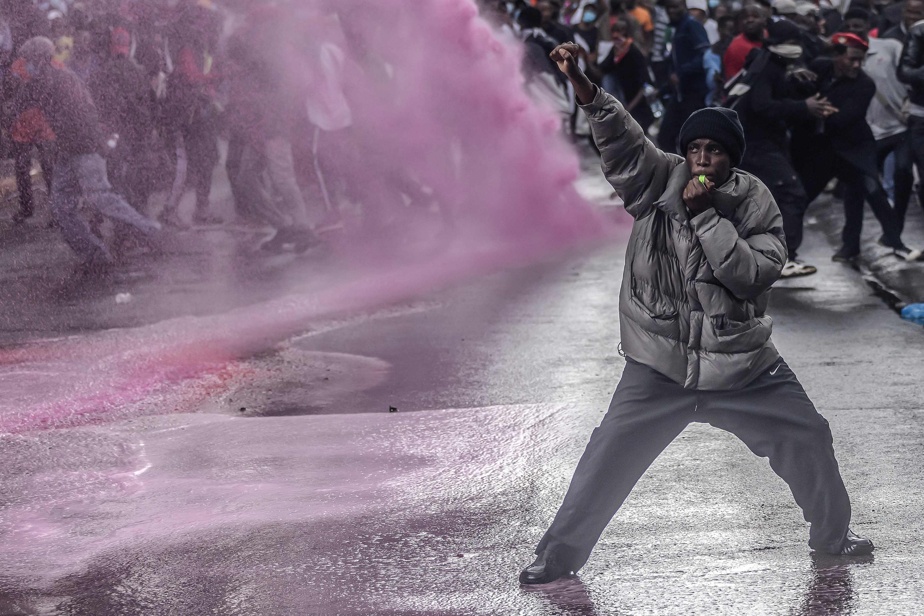(Nairobi) A protester was shot dead Thursday evening in the Kenyan capital Nairobi on the sidelines of demonstrations against a proposed new taxes, while a call for a general strike and to demonstrate again across the country was launched to Tuesday.
Led largely by young Kenyans, the rallies began at the start of the week in the capital Nairobi, before spreading on Thursday to numerous cities in this country, the economic powerhouse of East Africa.
The movement called “Occupy Parliament”, launched on social networks, outside any political framework, strongly mobilizes young people, who demand the pure and simple withdrawal of the finance bill from the government of President William Ruto.
“Tuesday, June 25:
On Thursday, the protests were punctuated by a few isolated clashes with security forces, who used tear gas grenades and water cannons, particularly in Nairobi’s business district. At least 200 people were injured, according to several organizations, including Amnesty International Kenya. The Kenyan Red Cross said eight were in serious condition on Friday.
Thursday evening, while many demonstrators lingered in a festive atmosphere in the center of Nairobi, “a demonstrator was shot and killed while trying to flee the police,” said an Amnesty International spokesperson. Kenya, Mathias Kinyoda. “The person who shot was in civilian clothes but he was accompanying the police,” he stressed.
The Independent Police Oversight Authority (IPOA) announced in a statement on Friday that it had “opened an investigation” to determine the circumstances of the death of a man “allegedly as a result of police shooting”.
In a report seen by AFP, Nairobi police said a 29-year-old man was taken to a hospital on Moi Avenue in the center on Thursday around 7 p.m. local time (12 p.m. Eastern time). businessman in the Kenyan capital, “unconscious with a thigh injury” before “succumbing” to his injuries.
No details are given on the nature of the injury and the circumstances of death.
A witness interviewed by AFP blamed the police: “We saw what happened,” he said, saying he was on the second floor of Union Towers, located on Moi Avenue.
“We could see the police opening fire on the group that was gathered there,” he said: “It was a police officer wearing a baseball cap because he got out of a police vehicle and got into it. ran back up.”
Kenyan police have been accused of serious human rights violations in the past. And demonstrations against the high cost of living, at the call of the opposition, gave rise to looting and deadly clashes in Kenya last year, leaving at least 50 dead according to NGOs.
The draft budget is currently under debate in Parliament, with a view to a final vote before June 30.
After an initial mobilization which brought together hundreds of people in Nairobi on Tuesday, the government reversed most of the provisions of the draft budget, notably the establishment of a 16% VAT on bread or a tax on private cars.
But the demonstrators also denounce the government’s desire to compensate for the announced withdrawal of taxes with other fiscal measures (increase in taxes on fuel and exported products in particular).
This risks, according to them, reducing their purchasing power, already burdened by last year’s increases in income tax and health contributions and the doubling of VAT on gasoline.
For the government, these tax measures are necessary to restore room for maneuver to the country, which is heavily in debt.
Kenya, one of East Africa’s fastest growing economies, recorded year-on-year inflation of 5.1% in May, with food and fuel prices rising by 6.2% respectively. % and 7.8%, according to the Central Bank.




